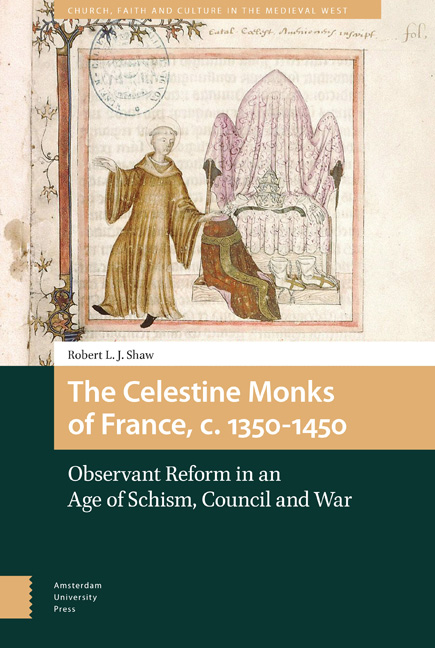Book contents
- Frontmatter
- Contents
- Maps and Figures
- Abbreviations
- Acknowledgements
- Introduction: The Celestine monks of France and the rise of ‘Observant’ reform
- Part I The French Celestines in their world
- Part II The world of the French Celestines
- Epilogue and conclusion
- Appendix 1 Lists and map
- Appendix 2 Reductions of foundation Masses (beyond anniversary Masses) at the Celestine monastery of Paris, 1414 and 1436
- Appendix 3 Reduction of foundation Masses (beyond anniversary masses) at the Celestine monastery of Sens, 1414
- Index
2 - The French Celestine constitutions and their heritage: Statute and spirituality in later medieval monastic reform
Published online by Cambridge University Press: 16 February 2021
- Frontmatter
- Contents
- Maps and Figures
- Abbreviations
- Acknowledgements
- Introduction: The Celestine monks of France and the rise of ‘Observant’ reform
- Part I The French Celestines in their world
- Part II The world of the French Celestines
- Epilogue and conclusion
- Appendix 1 Lists and map
- Appendix 2 Reductions of foundation Masses (beyond anniversary Masses) at the Celestine monastery of Paris, 1414 and 1436
- Appendix 3 Reduction of foundation Masses (beyond anniversary masses) at the Celestine monastery of Sens, 1414
- Index
Summary
On 25 January 1380, the Avignonese pope Clement VII granted independence to the French Celestines from their Italian brethren, in response to the ‘the humble supplications of our dearest son Charles, illustrious king of the French [Charles V], on your behalf’. He granted the French Celestines the right to hold provincial chapters every three years from then on and to elect a new provincial prior each time, in broad terms the same system of government that had been run on a larger scale in the previously united congregation, as will be seen. As mentioned in the introduction, the immediate background to this decision seems straightforward: the Great Western Schism, which had begun a mere sixteen months earlier and in which Clement VII and Charles V were central actors. The letter was somewhat vague about the reality of the Celestines being torn apart by competing papal obediences – it stated that the French Celestines were unable to get to the general chapter across the Alps due to ‘wars’, ‘divisions’ and finally ‘schisms, which alas reign in the sacred Church of God’ – but the real political context is clear enough: the French Celestines, with the support of the French king, were in allegiance to Clement VII, while their Italian brothers supported Urban VI. Nevertheless, the Celestine petition, as recorded by the letter, did not lead with external contingencies, but rather the internal situation of the French province. The loss of temporal goods is mentioned, perhaps a consequence of the risks of travel to the general chapter or the obstruction that the division presented for managing their affairs. But first and foremost among their complaints was that ‘since you lack a legitimate provincial prior at present, regular observance does not prevail as it ought to in the order, especially in its French parts’ (my italics). This could also be read as a fairly straightforward reference to the fact that the normal lines of obedience had been disrupted by schism: the Italian abbot chose the French Celestine provincial prior, but if the abbot was obedient to a different pope, then the legitimacy of their provincial prior, Pierre Pocquet, at least from the French standpoint, had to be reaffirmed – and indeed was. But the reference to ‘regular observance (observantia regularis)’ seems more significant.
- Type
- Chapter
- Information
- The Celestine Monks of France, c. 1350–1450Observant Reform in an Age of Schism, Council and War, pp. 65 - 116Publisher: Amsterdam University PressPrint publication year: 2018



